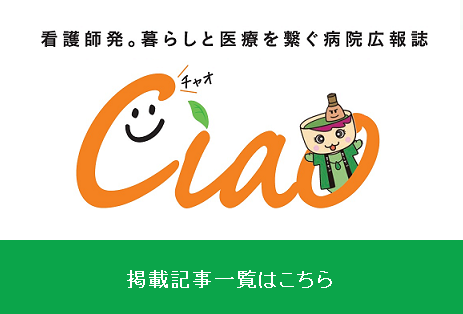English
ENGLISH03
OTHER POINTS/NOTES
Usage of smartphones and mobile phones
- Please set your mobile phone to silent mode and refrain from making calls when in the hospital.
- You may use your phone in the locations listed below. Please be considerate of other patients as the signal from your device may interfere with some medical equipment.
Areas where mobile phone usage is permitted
1F
front entrance hall, within the pay phone area, corridors, restaurant, kiosk and beauty salon.
Patient rooms
private and special rooms, within the day rooms, cafeteria and corridors.
*Excluding private and special rooms, please refrain from using mobile phones inside the patient rooms (text messaging and emails are allowed)
Ensuring safe and reliable medical treatment with our patients
To help us ensure safe and reliable medical treatment for all, please make sure to read the following ten points.
10 Essential Points for Ensuring Safe and Reliable Medical Treatment
1. Explaining the Patient’s Condition
When receiving explanations of your condition from your doctor, please make sure a family member is present, if possible.
If you wish to have your overall condition explained to you by your doctor, please notify your nurse and confirm your desired day and time.
They will contact your doctor to make an appointment. Due to the complexity of the human body and its mechanisms, photos, graphs or drawings may be used during the explanation. Explanatory notes will be given to the patient to better assist in understanding their condition.
2. Stating Your Will
Be sure to discuss your treatment with your doctor. Whether for surgery, medical examinations or blood transfusions, please make sure you are well aware of what has been explained to you regarding your treatment and carefully check the details of the consent form before signing.
Cases requiring emergency treatment are prioritized at the hospital. If the patient’s will is valid and clearly expressed, it will be followed accordingly.
If the patient is unable to clearly state their own will, we will proceed to administer the best treatment for the patient, after considering the wishes of the family. Please make sure to clearly state your will should you have any concerns related to blood transfusions, organ donation, religious matters, or use of respiratory apparatuses.
3. Cases of Acute or Severe Pain
If you feel acute pain, do not hesitate to inform a doctor or a nurse. It is our priority to find the best solution for the patient. However, please understand that due to limits on the amount of medication that can be administered, we may not be able to provide certain medications depending on your condition.
4. If the Patient has Questions or Doubts
Please do not hesitate to ask questions if there is anything you do not understand. We recommend to write down your questions in advance.
Please consult your doctor or nurse for concerns such as the following:
“My condition has changed/feels different today”
“This is not what was explained to me”
“I don’t know what I am taking this medication for”
5. Confirming Patient Names
Patients are required to wear wristbands displaying their names while in the hospital. For outpatient visits, we will confirm the patient’s identity using the numbered waiting ticket.
Please check your name together with a hospital representative. Please make sure to say your name out loud.
To avoid any mixups with other patients, be sure to check that it is your name on the IV drip or medication. For blood transfusions, please confirm that the name and blood type are correct.
6. Preventing Harm due to Tumbles or Falls
Patients may occasionally fall or tumble due to their condition or illness.
To prevent further harm, the attending physician may make changes to the patient’s bed or chair and administer or suppress certain medications.
If a patient is considered to be at risk, we may ask for the family’s cooperation.
7. For Focused Treatments such as Injections Performed by Medical Personnel
Distracting medical personnel when they are administering treatments such as injections, may endanger the patient being tested or treated. We ask for the cooperation and understanding of our patients and their families during the administration of treatments.
8. Preventing Hospital-acquired Infections
When carrying out procedures, our medical staff follow our hospital’s manual for combating hospital-acquired infections.
Our hospital houses patients carrying a wide range of pathogens. Other patients with serious medical conditions or low immunity are extremely susceptible to infection.
As such, hand disinfectants have been placed in front of each patient room for visitors to use to help prevent infection when at the hospital.
Before surgery, blood transfusions, and other similar procedures, patients may be tested for hepatitis and/or AIDS as a preventative measure. We appreciate your understanding and cooperation on this matter.
9. Innapropriate Behavior
Please be aware that appropriate measures will be taken should hospital staff be subject to any physical or verbal harassment, sexual or otherwise, by a patient or family member.
Patients may be discharged from the hospital should they choose to break the hospital’s rules by leaving or spending the night elsewhere without their doctor’s permission, or cause trouble or harm to other patients or staff.
10. We want to hear from you (Suggestion Box)
We have placed suggestion boxes in the examination waiting rooms (1F), on the south side of the outpatient surgery waiting room (1F), and in the day rooms within each ward (3-6F).
Please feel free to share your opinions and requests. You will find a file containing significant past submissions next to the suggestion boxes on the south side of the outpatient surgery waiting room (1F) and in the day rooms within each ward (3-6F).
Disaster Preparation
In the event of a natural disaster, please calmly follow the instructions of the hospital staff.
To those who decline blood transfusions due to religious beliefs.
When a patient declines a blood transfusion due to religious beliefs or concerns, we will respond as follows according to our Relative Bloodless Medicine policy *1.
- In order to care for the lives of our patients here at Nishio Municipal Hospital, various treatments, such as blood transfusions, are performed.
- We will do everything in our power to clearly explain our policy and help our patients, the family or their representative to gain a better understanding of our hospital. However, if we are unable to obtain the patient’s consent and there is still time to get appropriate treatment, we may recommend the patient to visit another medical institution.
-
We exercise the utmost caution when administering any blood transfusion.
If the patient or their family declines a transfusion due to their religion or a similar belief, we promise to respect their individual rights and work to provide an alternative treatment.
However, if a blood transfusion is deemed necessary to save the patient’s life, or if we are required to act immediately, a transfusion may be performed nonetheless.
*1 Relative Bloodless Medicine
In respecting the patient’s wishes, we will do our best to execute their treatment without the need of a blood transfusion. However, if a transfusion is deemed necessary to save the life of the patient, a blood transfusion will be performed.


